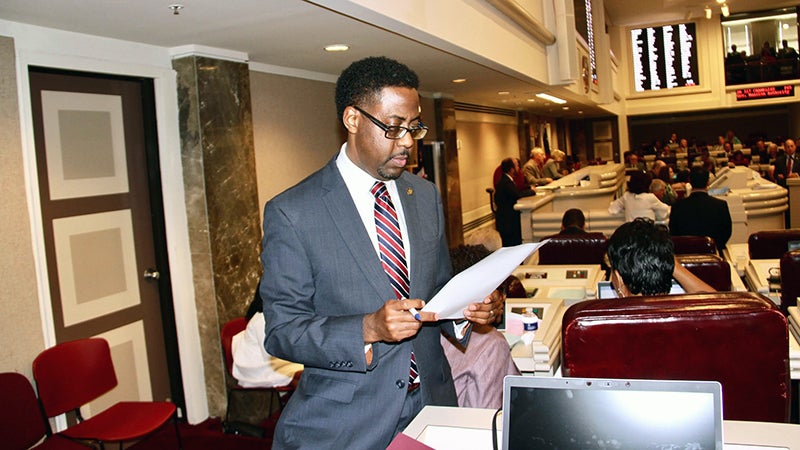Chestnut looks back on 2019 legislative session
Published 12:23 pm Thursday, June 27, 2019
Alabama Rep. Prince Chestnut, D-Selma, first took office following a special election in April 2017 – he only got to serve a few weeks of that year’s legislative session, so 2018 was his first full session at the state house.
Having just completed his second full legislative session, Chestnut credits his work as a lawyer and a judge for his ability to step into a lawmaker’s shoes and deftly craft legislation, read through contracts and do the work of a state legislator.
“Everything I’ve been doing for the last 15 years prepared me for it,” Chestnut said. “I think that’s important for legislators – a lot of people decide they want to run for office with no transferrable experience related to the position.”
Looking back on this year’s session, Chestnut was proud to see two of his bills cross the finish line and be signed into law.
“You always love the ones that you author,” Chestnut said.
One of those bills was Chestnut’s rural police bill, which allows rural communities to hire retired law enforcement officers to bolster their local departments and infuse them with skilled officers.
Chestnut said the bill was aimed at proving smaller communities with a competitive advantage in hiring experienced officers and was inspired by his hometown and similar communities.
“We have, in many respects, a revolving door for young officers, so the turnover rate is really significant,” Chestnut said, noting that many young recruits are hired by small forces and receive training and depart to larger areas after only a few years.
Another bill drafted by Chestnut that passed this year was his Municipal Audit Accountability Act, for which he drew inspiration from a case in Greene County that he worked on and an episode of the television show “American Greed,” which detailed a case in Dixon, Illinois where a city worker syphoned off more than $50 million from the city over a couple of decades.
The first draft of that bill, which creates triggers that would prompt the Alabama Department of Examiners of Public Accounts to conduct an immediate audit of a municipality, was scribbled on a napkin during legislative orientation this year.
“I’ve experienced situations over the years that involved municipal fraud,” Chestnut said. “What I was focused on was having some accountability on the municipal level.”
A bill that Chestnut was excited to see clear the Alabama House and Senate this year was the Equal Pay Act – Alabama was among one of the only states that had not previously passed such legislation.
“Last year, we tried to get it through and for some reason it didn’t make it,” Chestnut said. “We should be first in things like that, not 49th or 50th. That’s clearly a situation where people need to lead. Women should not have to work for a fraction of what men make for doing the exact same job.”
Chestnut also praised passage of the Alabama Incentives Modernization Act, which he says will entice businesses to locate in small and rural areas of the state.
Despite a number of successes, Chestnut also had a handful of bills that didn’t make it through, including his bill to make it a Class C felony to assault a working member of the press.
Chestnut proposed two voting rights bills this year, neither of which were passed.
The first was his “no excuse” absentee voting bill, which would have given people the chance to vote by absentee ballot without having to jump through hoops.
“I really felt like that one had a good chance of getting through,” Chestnut said.
The other bill would have established automatic voter registration in the state, but Chestnut knew that piece of legislation was a longshot since Alabama Secretary of State John Merrill, who recently announced his Senate campaign, opposed the measure.
Another of Chestnut’s bills that stalled out this year was one that would have protected the jobs of military service members called up for duty – it would ensure that their jobs were not threatened from the departure and provide a course of action in state court if that assurance was violated.
But Chestnut already has his eye on next year’s session.
“There’s so much to think about,” Chestnut said.
For starters, Chestnut is considering bringing a bill that would make judicial elections nonpartisan in the state, a move he believes is obvious since judges are meant to be impartial and unbiased.
However, Chestnut already expects resistance from both sides of the aisle.
“I think on the statewide level, you’re going to have Republicans oppose it, since they hold the majority of statewide offices,” Chestnut said. “On the local level, you’re probably going to have Democrats that oppose it. That’s how you know it’s a good bill, when both sides are against it.”
Chestnut also plans to bring his journalist protection bill and his military job assurance bill back for next year’s session.
On top of all of that, Chestnut is preparing for the possibility that legislators might be called back to Montgomery later this year for a special session to tackle the states beleaguered prison system.
Chestnut said that legislators have to establish a long-term solution to the problems plaguing Alabama prisons, which will likely require some form of criminal justice reform, not brief patches aimed at pacifying the federal government.
Further, he added that the process shouldn’t be driven by “partisan rancor,” but endeavored upon in good faith.
“We should want to do this right,” Chestnut said. “We have to come to a point in this state where we are not forced to do the right thing by the federal government.”






